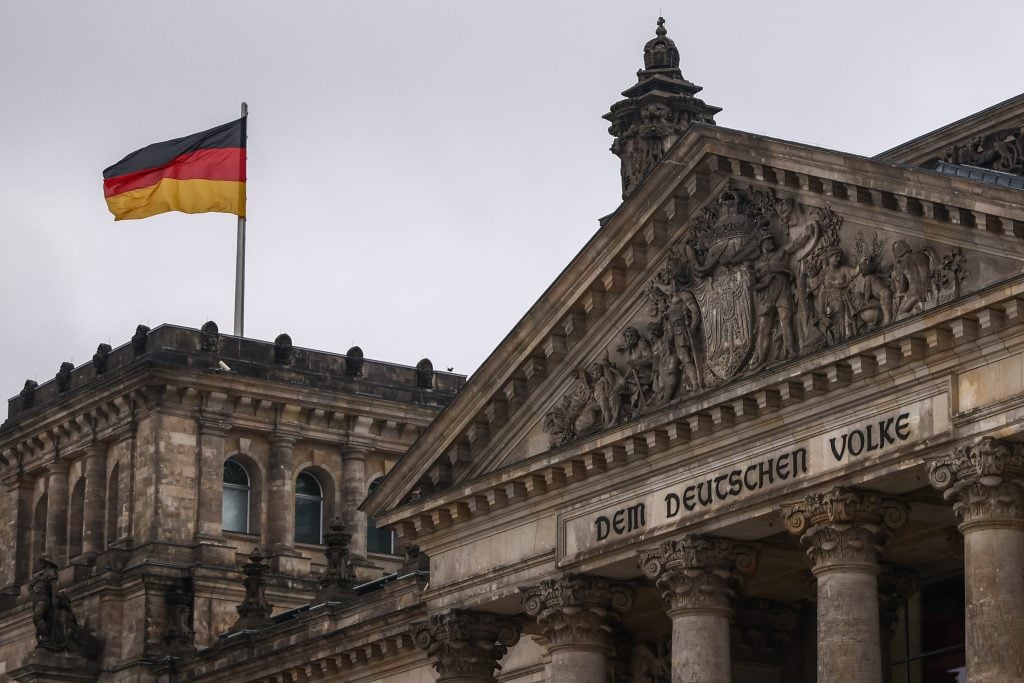Law & Politics
Berlin Court Convicts Curator Over Social Media Posts
The ruling comes shortly after Germany passed a highly controversial resolution to combat antisemitism.

The ruling comes shortly after Germany passed a highly controversial resolution to combat antisemitism.

Margaret Carrigan

A Berlin court has convicted a culture worker of criminal activity over social media posts they shared in the immediate aftermath of Hamas’s attack on Israel on October 7, 2023. The sentencing comes after lawmakers recently approved a highly controversial resolution to combat claims of antisemitism in Germany amid the Israel-Gaza War, heightening tensions in the country’s arts and culture scene.
Edwin Nasr, a Lebanese curator and writer based in Berlin, stood trial at the Berlin-Tiergarten district court on Monday, November 11, for social media posts they published on Instagram on October 8, 2023. One of the posts featured a collage of people fleeing Supernova festival, which Nasr captioned “poetic justice.” In another, Nasr wrote that the “anti-colonial struggle inherently entails bloodshed.”
Judge Karin Nissing convicted Nasr for condoning a criminal act, meting out a fine of €1,000 ($1,050), to be payed in allotments of €20 ($21) across 50 days. Her decision is not final and can be appealed.
According to a report in the German media outlet WELT, defense attorney Benjamin Düsberg shared a statement by Nasr in which they claimed not to have known the full details of the attack that took place at Supernova at the time of posting, having been aware only that some festival attendees had been forced to flee. A memo from the public prosecutor’s office noted that most German outlets only reported on the terrorist attack on Supernova in the evening of October 8, although the Times of Israel was much quicker to publicize the massacre.
Nasr added that the Instagram posts were not intended to justify the death of Israeli civilians and had been shared by media outlets without their proper context. “Nevertheless, I would like to apologize if I have hurt people,” Nasr said. They said the fallout from the Instagram posts has resulted in them receiving death threats and losing their livelihood.
Nasr, who moved to Berlin in 2020, has been involved in the Lebanese contemporary art non-profit Ashkal Alwan since 2019. Until September last year, they were also working as a curator at CCA Berlin – Center for Contemporary Arts.
The judge’s ruling comes shortly after Germany passed a highly controversial resolution to combat antisemitism, which would make public grants for culture and science projects dependent on adherence to the International Holocaust Remembrance Alliance’s (IHRA) definition of anti-semitism. Many prominent legal experts and intellectuals fear the resolution may suppress legitimate criticism of Israel at a time when its war in Gaza and occupation of Palestinian territories have been condemned by the U.N. and the International Court of Justice.
Ahead of the vote, on November 6, Amnesty International Germany said that while it welcomes the aim of introducing measures to combat antisemitism and racism, in its view the resolution “not only fails to achieve this goal, but also raises fears of serious violations of fundamental human rights and legal uncertainty,”
A group of around 150 Jewish artists, writers, and scholars living in Germany wrote an open letter in August expressing their “deep concerns” about the planned resolution. The letter claimed that while the overwhelming majority of antisemitic crimes originate in the German far right, the resolution would “further endanger ethnic and religious minorities, particularly our Arab and Muslim neighbors, who have already become targets of brutal police violence.”
Signatories include artists like Adam Broomberg and Candice Breitz. In a statement to DW, Breitz described the resolution as “a piece of simplistic dogma that is designed to protect and defend Zionist thinkers, not Jewish people” suggesting that its wording “perpetuates the dangerous notion that Jewish identity is inextricably linked to Israel’s ethnonationalist priorities.”
Parliament member Konstantin Kuhle said that the debate about antisemitism in Germany cannot be separated from the commitment to Israel’s right to exist, according to a report in Der Spiegel. “Anyone who rightly demands protection from discrimination and racism for themselves cannot remain silent when it comes to antisemitic narratives and clichés, exclusion and violence, which also come from Muslims.”
Hamas’s attack on Israel on October 7 killed 1,139 people and saw 251 taken hostage. Since then, Israel’s counter-offensive in Gaza has killed more than 41,870 people in Gaza, among them 16,765 children, according to the Gaza Ministry of Health, which is run by Hamas. More than 10,000 Gazans are also considered missing.
Since the start of the war in Gaza, frictions between Germany’s diverse and outspoken cultural scene and the highly cautious, pro-Israel stance of German politics have been the subject of widespread debate. Dozens of events, exhibitions, and projects have been called off amid growing fear that artists may lose funding and opportunities due to political views on Israel and Palestine that differ from the official state narrative.
Jo Lawson-Tancred contributed additional reporting.